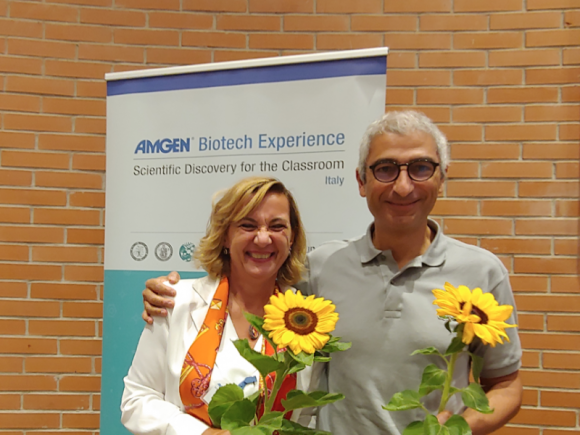A unique global exchange program is now underway with the Amgen Biotech Experience (ABE) in Europe. It started with Italy and France, where the program directors visited each other’s site to gain new perspectives on the program. Next year, it will expand to three teachers from each site. And they hope to pave the way to an eventual student exchange—enabling ABE students to benefit from not only a scientific sharing of knowledge but also a cultural one.
“That is how science is done,” says Alain Bessis, director of ABE France (right in the opening photo), who visited the Italian program site in September. “As scientists we travel abroad to discuss our research with others in English. For our teachers, it is something very good and fruitful to be able to discuss with each other about the way they implement the program in their home schools. For students, it could open up entirely new views of science.”
When he visited Italy, Bessis spoke at a public event about the ABE program and then met thereafter with staff and local directors, not only from Italy but also from the ABE Massachusetts site. It was an opportunity for in-depth discussion about the differences among the three sites.
For Anna Pascucci (left in the photo), director of ABE Italy, the exchange is already yielding valuable insights. She spent two days together with the staff in ABE France over the summer. Among the information that was striking to her was that the French program has the constant support of trained laboratory technicians.
“This is a rarity in Italy for which the burden of commitment of a teacher is really very heavy, having to organize everything by their own in the laboratories to carry out experiments with the students,” she explains. “This aspect has further strengthened the need in Italy to involve teams of teachers from the same school in order to facilitate mutual support.”
Pascucci was also struck by the active support of the French Ministry of Education in the program. That is another avenue her team plans to explore. “The experience was very interesting at different levels because it allowed us to understand aspects of the entire project approach in the field, compare resources, and understand the motivation and effectiveness of some choices, including experimental ones.”
Pascucci and Bessis have been working toward creating an ABE teacher exchange program since April 2019 at the regional meeting of European sites. Since then, they have taken to calling the exchange a “twinning” program. “Twins are known to have great understanding between them,” says Pascucci, who herself is a mother of twins. “They are open to positive exchange, learning from each other, and working together for mutual benefit. We strongly believe that a twinning for ABE could be of mutual benefit, allowing us to capitalize on the mutual experience to the benefit of each national program.”
By eventually extending the twinning to students, ABE will enable students to become actors in an international process with a “commitment to science education not limited to their class or school or national context,” Pascucci says. “Being pupils participating in ABE already represents a platform of common educational experience on which to build more.”
Bessis and Pascucci both agree that giving students the opportunity to be in direct contact with young people from other countries will give them a wealth of experience at different levels. Pascucci states, “They can then share with others both cultural and scientific experiences with a consequential and significant multiplier effect, further expanding the impact of the ABE program.”
